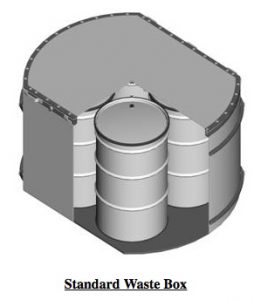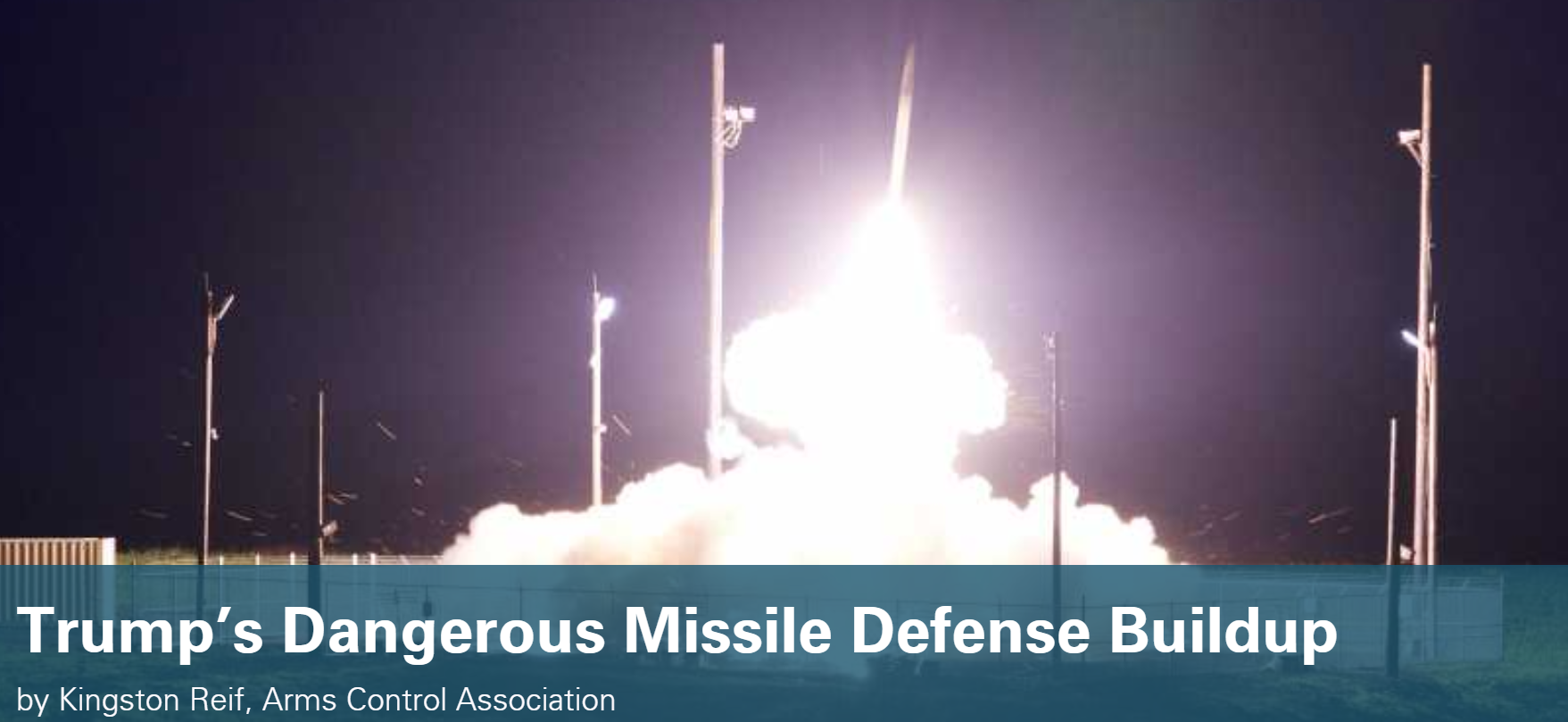2020
Nothing Found
It seems we can’t find what you’re looking for. Perhaps searching can help.
2019
Donald Trump’s Space Missile Plan Is Too Expensive and Will Not Work, Just Like His Border Wall, Experts Say
President Donald Trump’s new global missile defense plan would be too expensive and technologically taxing to effectively implement, leading experts have said.
The president unveiled his 2019 Missile Defense Review, the first of its kind since 2010, during an address Thursday at the Pentagon. He pledged to virtually eliminate any external threat to the United States, vowing to “to ensure that we can detect and destroy any missile launched against the United States anywhere, anytime.”
Commenting on this statement specifically, Ploughshares Fund think tank director Joseph Cirincione said during a press call that this “is simple to say, impossible to do.”
“If you liked the president’s border wall, wait until you see his space wall,” Cirincione, who also served as a professional staff member of House Armed Services Committee and Government Operations Committee responsible for congressional oversight of missile defense programs in the 1980s and early 1990s, added. “This is a complete fantasy.”
Advocacy Groups Go to Court to Stop WIPP Waste Volume Accounting Change
“Rather than pursuing the permit modification, the Department of Energy should comply with the legal capacity limit and begin a public process to explain what additional waste it wants to bring to WIPP and how it intends to address the loss of disposal space that cannot be used because of the significant underground contamination,” said Scott Kovac, operations and research director of NukeWatch.
BY: WAYNE BARBER
Two advocacy groups in New Mexico filed a legal appeal Thursday seeking to undo a New Mexico Environment Department order that allows the Energy Department to change the way it records underground transuranic waste volume at its Waste Isolation Pilot Plant (WIPP) near Carlsbad.
The Southwest Research and Information Center (SRIC) and Nuclear Watch New Mexico (NWNM) filed their notice of appeal in the New Mexico Court of Appeals to block the modification to WIPP’s state hazardous waste permit.
While it technically takes effect this month, as a practical matter the new counting system won’t be instituted right away because DOE has not drafted its policy on implementation, said SRIC Administrator Don Hancock by email.
A Dec. 21 order from then-state Environment Department Secretary Butch Tongate authorized DOE to stop recording empty spaces between container drums as waste. The order adopted the findings of state Hearing Officer Max Shepherd, who recommended waste volume counted against the disposal cap set by the 1992 WIPP Land Withdrawal Act should cover only the actual waste inside containers.
Appeal Targets Permit Change for US Nuclear Repository
By Associated Press | Thursday, January 17th, 2019 at 12:33pm
ALBUQUERQUE, N.M. — Watchdog groups are appealing a recent permit change approval by New Mexico regulators that could ultimately allow for more waste to be placed at the U.S. government’s only underground nuclear waste repository.
The approval by the state Environment Department came in the final days of former Gov. Susana Martinez’s administration. The change was requested earlier by the U.S. Energy Department and the contractor that operates the Waste Isolation Pilot Plant.
The permit modification changes the way the volume of waste is calculated. Specifically, it excludes the empty space inside waste packaging containers.
The Southwest Research and Information Center and Nuclear Watch New Mexico argue the modification is unlawful.
Critics also are concerned the change could be a first step in expanding the repository’s mission to hold other kinds of waste.
Smith Statement on Trump Missile Defense Review
Washington, DC – Today, House Armed Services Committee Chairman Adam Smith (D-WA) released the following statement about the Trump administration’s Missile Defense Review:
“The missile defense policy of the United States must follow some key principles.”
“First, it is essential that we ensure we are spending money on programs that are reliable and rigorously tested before they are deployed. We need to know that we are putting scarce taxpayer dollars to good use, for example improving reliability of the current system, rather than rushing to buy and deploy unproven missile defense systems. It is common sense to insist on this principle when it comes to programs that protect the American people and our allies, particularly in the context of the growing North Korea threat.
“Second, we must avoid missile defense policies that will fuel a nuclear arms race. Strategic stability is an essential component of U.S. national security, and it does not serve our long-term interest to take steps that incentivize Russia and China to increase the number and capability of their nuclear weapons.
“While it is essential that we continue investing in proven missile defense efforts, I am concerned that this missile defense review could lead to greater investment in areas that do not follow these principles, such as a space-based interceptor layer that has been studied repeatedly and found to be technologically challenging and prohibitively expensive.
“Moreover, we must consider missile defense and effective arms control policy as part of our deterrence capabilities. I am gravely concerned about President Trump’s broader strategy to withdraw us from international arms control agreements, dismiss allies, and expand the role of nuclear weapons in U.S. defense policy, which could further siphon funding from much-needed budget priorities and exacerbate a new nuclear arms race.”
armscontrol.org | January 17th, 2019
The Trump administration’s long-awaited Missile Defense Review, which was released today, proposes a significant and costly expansion of the role and scope of U.S. missile defenses that is likely to exacerbate Russian and Chinese concerns about the threat to their strategic nuclear deterrents, undermine strategic stability, and further complicate the prospects for additional nuclear arms reductions.
Of particular concern was President Donald Trump’s statement during his remarks at the Pentagon that the goal of U.S. missile defenses is to “ensure we can detect and destroy any missile launched against the United States anywhere, anytime, anyplace.” This would be a costly, unachievable, and destabilizing departure from longstanding policy and contradicts the text of the review, which limits U.S. homeland missiles defense to their traditional role of defending against limited attacks from North Korea or Iran. Continue reading
NukeWatch Joins Suit To Stop WIPP Expansion

NukeWatch Joins Suit To Stop WIPP Expansion
On January 17, 2019, Southwest Research and Information Center (SRIC) and Nuclear Watch New Mexico (NWNM) filed an appeal in the New Mexico Court of Appeals to overturn the New Mexico Environment Department (NMED) approval of the Waste Isolation Pilot Plant (WIPP) Disposal Volume permit modification, which was issued on December 21, 2018.
The modification would allow expansion of WIPP’s capacity by approximately 30 percent and was issued over the repeated opposition of many New Mexico organizations.
US to Begin INF Treaty Pullout Next Month After Russia Missile Talks Fail
Officials reject Russian offer to inspect new missile; US says it will suspend observance of treaty on 2 February.
By JULIAN BORGER in Washington theguardian.com | Wed 16 Jan 2019 18.29 EST
Sergei Lavrov, Russia’s foreign minister, accused the US of intransigence.Photograph: Pavel Golovkin/AP
The US has rejected Moscow’s offer to inspect a new Russian missile suspected of violating a key cold-war era treaty, and warned that it would suspend observance of the treaty on 2 February, giving six-month notice of a complete withdrawal.
The under-secretary of state for arms control and international security, Andrea Thompson, confirmed the US intention to withdraw from the treaty after a meeting with a Russian delegation in Geneva, which both sides described as a failure.
“The Cold War times have passed. We don’t need an rearmament debate, we need a debate about disarming. We cannot answer today’s security questions with the deterrence ideologies from last century.”
– Oliver Meier in Berlin, in response to a question about the INF Treaty
Chinese “carrier killers” (military vehicles carrying DF-21D anti-ship ballistic missiles, potentially capable of sinking a U.S. Nimitz-class aircraft carrier in a single strike) during a 2015 military parade in Beijing.Nuclear arms treaty faces collapse after failed US-Russia talks
By BEN SIMON/ AP channelnewsasia.com
Geneva (AFP) – The survival of a key nuclear arms control treaty was cast further in doubt Tuesday after the US and Russia blamed each other for pushing the agreement to the brink of collapse.
Senior diplomats from both countries met in Geneva amid widespread concern over the fate of the bilateral Intermediate-Range Nuclear Forces Treaty, which successfully put an end to a mini-arms race after it was signed in 1987.
US President Donald Trump said in October that his country would pull out of the deal unless Russia stops violating it. Russian President Vladimir Putin has threatened to develop nuclear missiles banned under the treaty if it is scrapped.
2018
Nothing Found
It seems we can’t find what you’re looking for. Perhaps searching can help.
2017
Nothing Found
It seems we can’t find what you’re looking for. Perhaps searching can help.
2016
Nothing Found
It seems we can’t find what you’re looking for. Perhaps searching can help.
2015
Nothing Found
It seems we can’t find what you’re looking for. Perhaps searching can help.

